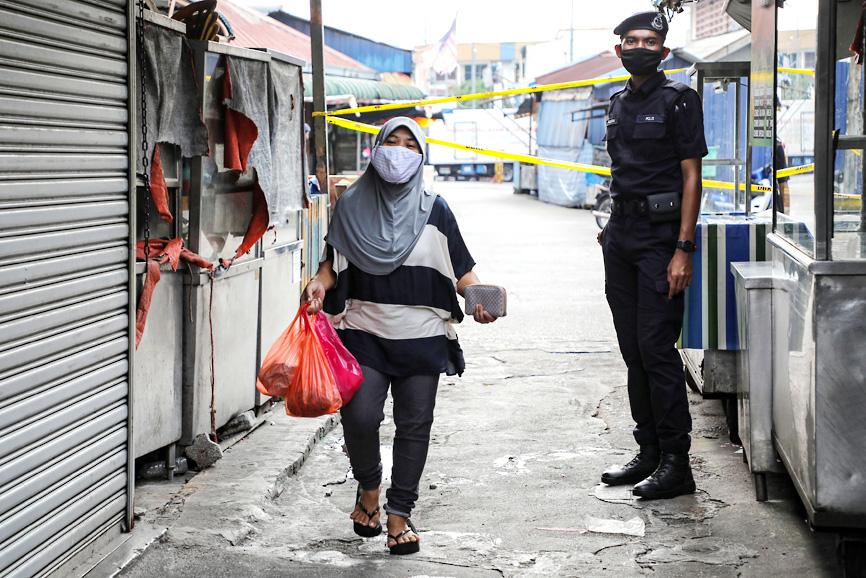Malaysian authorities have advised women to wear makeup, not to nag their husbands and speak with a cartoon character’s soothing voice during the virus lockdown, sparking a flood of mockery online.
Like many countries, Malaysia has ordered all citizens to stay at home to stem the spread of COVID-19, which, as of yesterday, had killed at least 39,070 people globally.
In a series of online posters with the hashtag #WomenPreventCOVID19, the Malaysian Ministry of Women and Family Development issued advice on how to avoid domestic conflicts during the partial lockdown, which began on March 18.

Photo: Reuters
One of the campaign posters depicted a man sitting on a sofa, and asked women to refrain from being “sarcastic” if they need help with household chores.
Avoid nagging your husband, another poster said, attempting to inject humor by using a voice similar to the anime character Doraemon — a blue robot cat popular across Asia.
The post was removed yesterday afternoon following a flood of criticism, with many accusing the government of sexism.
It “is extremely condescending both to women and men,” said Nisha Sabanayagam, a manager at Malaysian advocacy group All Women’s Action Society.
“These posters promote the concept of gender inequality and perpetuate the concept of patriarchy,” she said by telephone.
The posters, uploaded on Facebook and Instragram, drew widespread ridicule online, with social media users urging the government to remove them.
“How did we go from preventing baby dumping, fighting domestic violence to some sad variant of the Obedient Wives Club?” Twitter user @yinshaoloong wrote.
“No tips on how to deal with domestic violence?” asked another user, @honeyean.
“This must be a pressing issue,” one Facebook post said. “How will dressing up and putting on makeup at home [prevent] COVID-19? Pray, tell?”
“It’s already 2020, please progress. Focus on more important matters for women,” another said.
There have been fears of a surge in domestic violence worldwide, as the stress caused by confinement and job insecurity increase the likelihood of conflicts.
A government helpline for vulnerable people, including victims of domestic abuse, has seen an increase in calls of more than 50 percent since the start of the lockdown, local media reported.

The Ministry of the Interior (MOI) is to tighten rules for candidates running for public office, requiring them to declare that they do not hold a Chinese household registration or passport, and that they possess no other foreign citizenship. The requirement was set out in a draft amendment to the Enforcement Rules of the Public Officials Election and Recall Act (公職人員選舉罷免法 ) released by the ministry on Thursday. Under the proposal, candidates would need to make the declaration when submitting their registration forms, which would be published in the official election bulletin. The move follows the removal of several elected officials who were

The Republic of China (ROC) is celebrating its 114th Double Ten National Day today, featuring military parades and a variety of performances and speeches in front of the Presidential Office in Taipei. The Taiwan Taiko Association opened the celebrations with a 100-drummer performance, including young percussionists. As per tradition, an air force Mirage 2000 fighter jet flew over the Presidential Office as a part of the performance. The Honor Guards of the ROC and its marching band also heralded in a military parade. Students from Taichung's Shin Min High School then followed with a colorful performance using floral imagery to represent Taiwan's alternate name

FOUR DESIGNATED AREAS: Notices were issued for live-fire exercises in waters south and northwest of Penghu, northeast of Keelung and west of Kaohsiung, they said The military is planning three major annual exercises across the army, navy and air force this month, with the navy’s “Hai Chiang” (海強, “Sea Strong”) drills running from today through Thursday, the Ministry of National Defense said yesterday. The Hai Chiang exercise, which is to take place in waters surrounding Taiwan, would feature P-3C Orion maritime patrol aircraft and S-70C anti-submarine helicopters, the ministry said, adding that the drills aim to bolster the nation’s offshore defensive capabilities. China has intensified military and psychological pressure against Taiwan, repeatedly sending warplanes and vessels into areas near the nation’s air defense identification zone and across

A Chinese takeover of Taiwan would severely threaten the national security of the US, Japan, the Philippines and other nations, while global economic losses could reach US$10 trillion, National Security Council Deputy Secretary-General Lin Fei-fan (林飛帆) wrote in an article published yesterday in Foreign Affairs. “The future of Taiwan is not merely a regional concern; it is a test of whether the international order can withstand the pressure of authoritarian expansionism,” Lin wrote in the article titled “Taiwan’s Plan for Peace Through Strength — How Investments in Resilience Can Deter Beijing.” Chinese President Xi Jinping’s (習近平) intent to take Taiwan by force